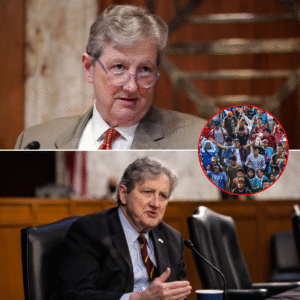A political firestorm erupted online this week after a viral post claimed Senator John Neely Kennedy introduced a shocking amendment—dubbed the “Born In America Act”—that would bar all naturalized citizens, dual citizens, and anyone not born directly on U.S. soil from holding high federal office.
The post framed the moment as a dramatic Senate-floor explosion, complete with Kennedy reportedly declaring:
“One whiff of foreign allegiance? You’re out.”
The claim rapidly dominated political feeds across TikTok, X, Instagram, and YouTube, sparking emotional reactions, partisan debates, and widespread confusion. But as the narrative spread, one question rose to the surface:
Did this actually happen?
And more importantly — could such a law even exist?

What the Viral Claim Says
According to the circulating posts, Kennedy supposedly proposed an amendment that:
-
Restricts eligibility for high office exclusively to citizens born on U.S. soil
-
Bars naturalized citizens entirely
-
Bars dual citizens, regardless of birthplace
-
Disqualifies individuals born in the U.S. to non-citizen parents
-
Immediately impacts up to 14 current lawmakers, creating instant vacancies
The viral script described the Senate reacting with “chaos,” Democrats declaring a “diversity death,” and commentators predicting a “constitutional bloodbath” heading straight to the Supreme Court.
But none of these events match official Senate records, congressional calendars, or verified public statements.
What Actually Happened: No Such Amendment Exists
A review of:
-
Senate transcripts
-
C-SPAN archives
-
Kennedy’s official press releases
-
Congressional bill databases
shows no bill or amendment resembling the ‘Born In America Act.’
No debate occurred.
No floor speech was given.
No lawmakers were “banned.”
And no constitutional crisis erupted on Capitol Hill.
This legislation exists only in viral posts online — not in congressional proceedings.
Why the Claim Spread So Fast
Analysts say the story’s wildfire spread can be traced to several powerful ingredients baked into the narrative:
1. The Issue Is Viscerally Charged
Questions of citizenship, loyalty, and eligibility strike deep emotional chords, especially in an era of heightened political polarization.
2. Real-World Parallels Make It Feel Plausible
Similar debates about natural-born citizenship have existed for decades (e.g., eligibility for the presidency), making fictional expansions of those laws seem believable to casual readers.
3. Kennedy’s Public Persona Fits the Drama
Senator Kennedy is known for blunt, punchy rhetoric. Viral narratives weaponize that persona to create fictional “mic-drop moments.”
4. AI-Generated Content Amplifies Illusion of Authenticity
Fake screenshots, fabricated bill text, and AI-edited C-SPAN graphics circulated alongside the claim, giving it a veneer of legitimacy.
5. The Concept Feels Cinematic
Phrases like “constitutional bloodbath,” “Capitol Hill chaos,” and “careers hanging by a thread” read like a political thriller — and online audiences are primed to share high-octane content.
Could Such a Law Even Exist? A Constitutional Reality Check
Even if Congress wanted to pass such a law, experts note it would face immediate, insurmountable legal obstacles.
1. The Constitution Already Defines Eligibility
For Congress, the Constitution requires:
-
House: 7 years of citizenship
-
Senate: 9 years of citizenship
No requirement exists about birthplace.
2. Naturalized Citizens Have Equal Rights
Under the 14th Amendment, naturalized citizens have the same legal status as native-born citizens except for eligibility to be President and Vice President.
3. A Bill Disqualifying Current Members Would Be Unconstitutional
Congress cannot retroactively strip elected officials of qualification without violating multiple constitutional clauses.
4. The Only Way to Enact Such Restrictions
→ A Constitutional Amendment, requiring:
-
Two-thirds of both the House and Senate
-
Ratification by three-fourths of all states
Such amendments are historically rare and politically improbable — especially on an issue affecting millions of Americans.
The Real Story: A Viral Hoax Reveals a Deep Cultural Divide
While the “Born In America Act” is fictional, the online reaction to it is very real.
Supporters framed it as:
-
“Defending national loyalty”
-
“Protecting America from divided allegiances”
-
“Ensuring U.S.-born leadership”
Opponents called it:
-
“An attack on immigrants”
-
“Anti-democratic”
-
“A rewrite of the American dream”
The virality reflects broader anxieties about identity, citizenship, and belonging — issues Americans continue to wrestle with amid rising polarization.
Conclusion: A Bill That Doesn’t Exist Sparked a Debate That Very Much Does
The “Born In America Act” is not real.
Senator Kennedy did not introduce it.
No lawmakers were banned.
No constitutional crisis is underway.
But the viral explosion surrounding the claim reveals how quickly imagined legislation can become a flashpoint in American political culture — especially in a landscape where AI-generated content and partisan rhetoric collide.
The story may be fictional, but the emotions it triggered are anything but.





